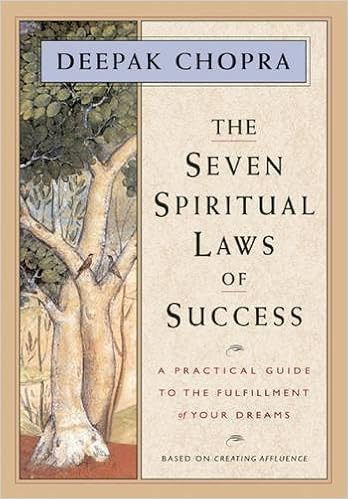"Modern science is based on the Latin injunction ignoramus - 'we do not know'. It assumes that we don't know everything. Even more critically, it accepts that the things we think we know could be proven wrong as we gain more knowledge. No concept, idea or theory is sacred and beyond challenge". - Yuval Noah Harari. This blog is a documentation of my journey of enlightenment, knowledge, and the pursuit of physical and emotional well-being.
Wednesday, March 15, 2017
The Seven Spiritual Laws of Success
The format of this book is very simple. The author lists each spiritual law, then gives examples of how to put the laws into practice.
1. The Law of Pure Potentiality: Take time to be silent, to just BE. Meditate for 30 minutes twice a day. Silently witness the intelligence within every living thing. Practice non-judgment.
2. The Law of Giving: Today, bring whoever you encounter a gift: a compliment or flower. Gratefully receive gifts. Keep wealth circulating by giving and receiving care, affection, appreciation and love.
3. The Law of Karma: Every action generates a force of energy that returns to us in like kind. Choosing actions that bring happiness and success to others ensures the flow of happiness and success to you.
4. The Law of Least Effort: Accept people, situations, and events as they occur. Take responsibility for your situation and for all events seen as problems. Relinquish the need to defend your point of view.
5. The Law of Intention and Desire: Inherent in every intention and desire is the mechanics for its fulfillment. Make a list of desires. Trust that when things don’t seem to go your way, there is a reason.
6. The Law of Detachment: Allow yourself and others the freedom to be who they are. Do not force solutions—allow solutions to spontaneously emerge. Uncertainty is essential, and your path to freedom.
7. The Law of Dharma: Seek your higher Self. Discover your unique talents. Ask yourself how you are best suited to serve humanity. Using your unique talents and serving others brings unlimited bliss and abundance.
After contemplating this book and meditating on how this book is put into action, I've started to see that the core premise of a lot of these books imply a certain degree of dissatisfaction with what your current state of life is.
Certainly, none of the above laws imply that, but examples given in the book point out that people can apply these laws, as the title suggests, to the end of "fulfillment of your dreams", and the subtitle of the book is "Creating Affluence". I believe in constantly improving oneself, but when the pretext for a methodology is somehow garnering more for oneself vs. cultivating happiness, satisfaction and altruism, then I'm a little more cautious about that methodology.
Still, I believe one can put these laws into practice in a non-selfish way.
Subscribe to:
Post Comments (Atom)

No comments:
Post a Comment